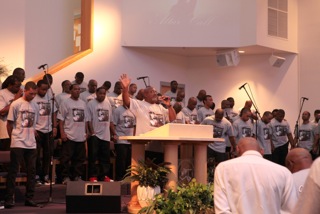
If more choirs or the congregations looked like this, what would our homes and communities look like? (Photo courtesy Once Upon a Flash Photography)
In part 1, I talked about Hanna Rosin’s book The End of Men and the Rise of Women and suggested that black male leadership in various church ministries could have enormous benefits for black men and black communities. The black church can be an effective place to prepare leaders—leaders that, for better or for worse, communities turn to in order to solve their most pressing problems and that civic leaders respect and court. Between the transferable leadership skills experience and the accountability and sense of community that church membership offers, African American male church members might find themselves on the college campuses and in the jobs that women have taken over.
I left off with the question as to whether black men could increase their church membership numbers, assume more leadership roles in the church, and transfer those leadership skills to education or work opportunities that would put them back in the workforce, without somehow putting women down or keeping them out.
I don’t want men to replace women or to erode women’s gains. I don’t like the subtitle of Rosin’s book, and I’m not sure she means it how the cover would suggest. As a feminist, I believe in equality and have a problem with all philosophies suggesting or outright stating that one group must have less for another group to have more. Nonetheless, I pose the question as whether black men, by increasing their membership rolls and leadership roles specifically in the black church, can advance economically and in education without subjugating women, because black people are a unique case.
Not only do we have some of the highest rates of unemployment and lowest rates of college attainment in the country, but according to this 2011 study, we church-going black folk are also the most likely group of people to “strongly agree that the Bible is totally accurate in all of the principles it teaches.†For some churches, this means women don’t speak or lead in the church, no matter how few men there are. It also means women submit in the home. Even without large numbers of men in the church to hear Paul’s command, Christian black women, in my experience, remain committed to upholding male leadership in the home. And a man who hasn’t earned his leadership but has enough biblical knowledge to say the Bible commands it may also believe the Bible sanctions dominance, violence and demands that black women give up their education and careers when the man can’t handle the ground they’ve been gaining outside the home.
According to Hanna Rosin, this likely won’t happen. She says college-educated couples tend to have “seesaw marriages.†In these extremely stable unions, gender doesn’t define roles; different people assume different roles when it just makes sense to do so. But those who see the seesaw as an “unnatural calamity†out of God’s order may require some new lessons, some feminist theology outside of the normal teachings, to keep their roles in balance.

I truly believe that the problem with submission/leadership as described in the Bible is a lack of sricptural study and placing verses in their proper contexts. Then mix that in with cultural traditions and you’ll have people making all sorts heretic statements.